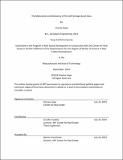The maturation and resiliency of the self-storage asset class
Author(s)
Hope, Charles(Charles Thomas)
Download1135868027-MIT.pdf (766.8Kb)
Other Contributors
Massachusetts Institute of Technology. Center for Real Estate. Program in Real Estate Development.
Advisor
Jennifer Cookke.
Terms of use
Metadata
Show full item recordAbstract
This thesis affirms that self-storage is further maturing into a core type asset class in juxtaposition to the characteristics of the traditional core asset types: multifamily, office, retail and industrial. This shift is shown by an increased participation of traditional core investors in the space, the resiliency of the product and the future of the industry. Core investors seek a risk and return profile that favors the conservative end of the security market line. They seek more stabilized and forecastable assets than value add or opportunistic funds (Geltner, Miller, Clayton, & Eichholtz, 2014). Even though the percentage of self-storage in institutional portfolios is still small due to fragmentation of the industry and self-storage's total market share, the investment opportunity is growing due to its proven resiliency through market and natural disruptions. This resiliency is evident in the micro-level occupancy and cash flow performance of self-storage properties as well as the macro-level total returns of the class over time. The resilient nature of the class and the resulting higher long-term returns have attracted core asset investors to diversify their portfolios to include self-storage assets at an increasing rate. The future of self-storage is strong due to positive sentiment and culture associated with self-storage. Sophisticated parties on both the user and investors sides are increasing their participation in the industry. The resulting outlook is positive for growth and maturation of the self-storage asset class.
Description
This electronic version was submitted by the student author. The certified thesis is available in the Institute Archives and Special Collections. Thesis: S.M. in Real Estate Development, Massachusetts Institute of Technology, Program in Real Estate Development in conjunction with the Center for Real Estate, 2019 Cataloged from PDF version of thesis. Includes bibliographical references (pages 50-51).
Date issued
2019Department
Massachusetts Institute of Technology. Center for Real Estate. Program in Real Estate Development; Massachusetts Institute of Technology. Center for Real EstatePublisher
Massachusetts Institute of Technology
Keywords
Center for Real Estate. Program in Real Estate Development.